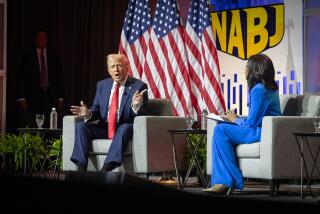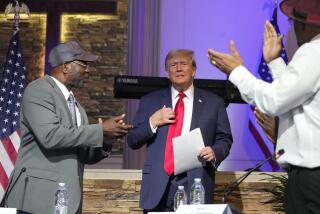Black Leaders Vow United Front to Tackle Problems : Civil rights: Planned alliance will target youth, urban ills. Farrakhan tones down his rhetoric at three-day summit organized by the NAACP.
- Share via
BALTIMORE — In a rare show of unity, a host of African American leaders, ranging from the controversial Louis Farrakhan to the mainstream Jesse Jackson, pledged to form a coalition Monday to seek solutions to some of the problems that bedevil black youths and black urban communities.
To achieve this unity, Nation of Islam leader Farrakhan, denounced often by outsiders for a drumbeat of what seems like anti-Semitism and anti-white sentiment in his speeches, spoke in somewhat conciliatory tones and effusively praised the National Assn. for the Advancement of Colored People for convening the three-day National African-American Leadership Summit, which closes today.
Noting that many outsiders had objected to the invitation extended to him by the NAACP, Farrakhan said: “This is a family matter, and I am a member of our family.”
Speaking at a meeting in Dunbar Community High School in Baltimore that was televised nationally by Black Entertainment Television, Farrakhan said: “The NAACP is the oldest, most credible civil rights organization in this country. I’m a life member of the NAACP . . . So I don’t believe I’m a stranger. I’ve been invited into a house that belongs, in part, to me.”
Alluding to threats to boycott the NAACP for inviting him, Farrakhan said: “You cannot punish us for coming together as a family . . . If anyone threatens us because we are coming together, then we will deal with it at the appropriate time.”
Jackson, who has campaigned in the past for the Democratic Party nomination for President, looked uncomfortable with some of the rhetoric in the auditorium and tried to temper it from time to time.
Jackson objected when John Henry Clark, a popular historian, called on African Americans to help stamp out white power in South Africa. Clark told the audience that President Nelson Mandela does not really rule South Africa because its economy and infrastructure were still in the hands of the whites.
“South Africa will be free in the only way it can be free,” Clark said to thunderous applause. “People spilled your blood to take your country. You’re going to have to spill the blood to take it back.”
“I do not accept his conclusion,” Jackson said. “ . . . I believe an eye for an eye, a tooth for a tooth and a life for a life leaves you blind, disfigured and dead. Someone has to stop the killing.”
But there were few conflicts like this in the two-hour meeting that included statements from a dozen African American leaders and a few questions from viewers and members of the audience.
Benjamin F. Chavis Jr., the NAACP executive director who conceived the idea of the summit, said that the leaders had already decided that the coalition would continue after the summit and would meet again.
Although the meetings were closed to the news media, Chavis said that the leaders had been discussing empowerment of black youth, economic development of black communities and spiritual uplift.
“We must develop African American businesses and support them when they are developed,” Chavis said.
The leaders may offer more details about their goals when the summit closes.
More to Read
Sign up for Essential California
The most important California stories and recommendations in your inbox every morning.
You may occasionally receive promotional content from the Los Angeles Times.













